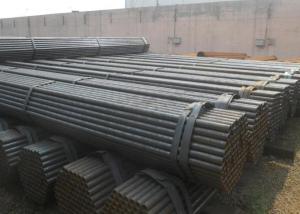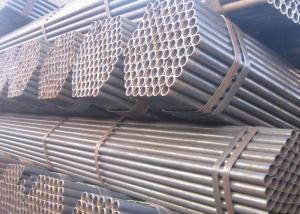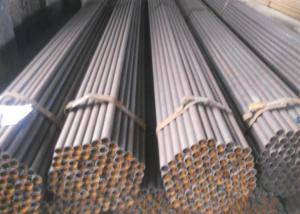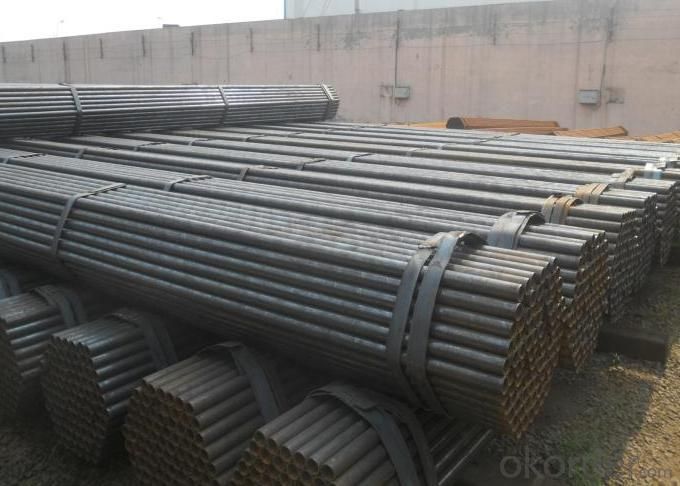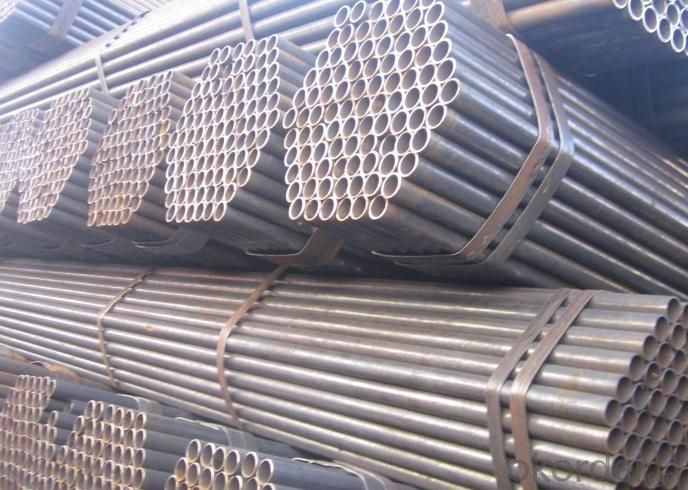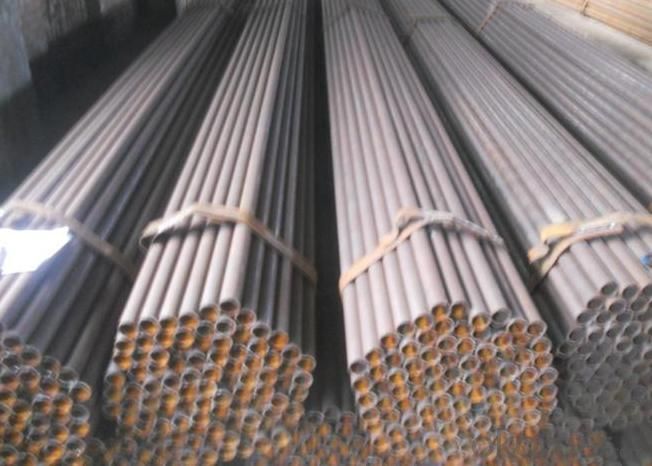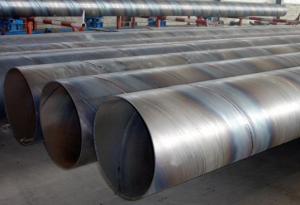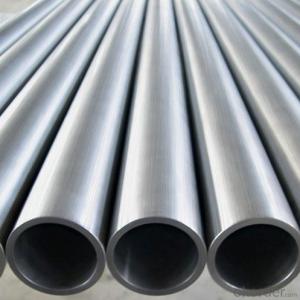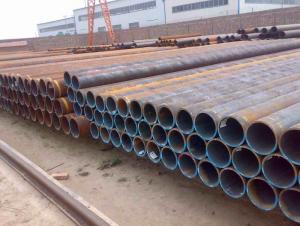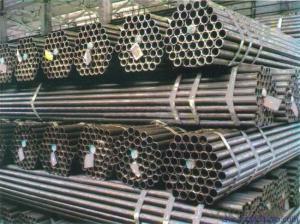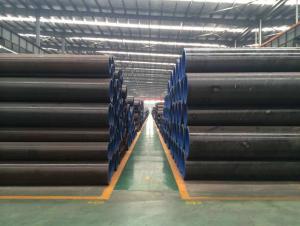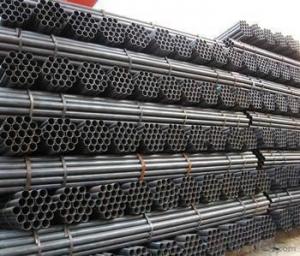High Quality ERW Welded Steel Pipes
- Loading Port:
- China Main Port
- Payment Terms:
- TT or L/C
- Min Order Qty:
- 50MT m.t.
- Supply Capability:
- based on order m.t./month
OKorder Service Pledge
OKorder Financial Service
You Might Also Like
ERW Welded Steel Pipes
Application of High Quality ERW Welded Steel Pipes
It is widely applied to line pipe and casing and tubing in oil transportation and casing field, and it is used in Low,high pressure liquid and gassy transportation and it is also good Structure pipe (for furniture, window, door, building , bridge, mechanical etc).
Package: bundles with anti-rust painting and with plastic caps
Standard of High Quality ERW Welded Steel Pipes
API SPEC 5L, API SPEC 5CT, ASTM A53, GB/T9711.1
Steel Grade of High Quality ERW Welded Steel Pipes
API SPEC 5L: B, X42, X46, X52, X56, X60, X65
API SPEC 5CT: J55, K55, N80, L80-1
ASTM A53: A, B, C
GB/T9711.1:L242、L290、L320、L360、L390、L415、L450
Sizes of pipes of High Quality ERW Welded Steel Pipes
*Remark: Besides below sizes, we also can arrange production based on requirement of customers
OD | WT | WEIGHT | ||||
INCH | MM | SCH | MM | INCH | KG/M | LB/INCH |
1 1/2” | 48.3 | STD-40 | 3.68 | 0.145 | 4.09 | 2.75 |
1 1/2” | 48.3 | XS-80 | 5.08 | 0.2 | 5.47 | 3.68 |
2” | 60.3 | STD-40 | 3.91 | 0.154 | 5.49 | 3.69 |
2” | 60.3 | XS-80 | 5.54 | 0.218 | 7.56 | 5.08 |
2 1/2” | 73 | STD-40 | 5.16 | 0.203 | 8.72 | 5.86 |
2 1/2” | 73 | XS-80 | 7.01 | 0.276 | 11.52 | 7.74 |
3” | 88.9 | STD-40 | 5.49 | 0.216 | 11.41 | 7.67 |
3” | 88.9 | XS-80 | 7.62 | 0.3 | 15.43 | 10.37 |
3 1/2” | 101.6 | STD-40 | 5.74 | 0.226 | 13.71 | 9.21 |
3 1/2” | 101.6 | XS-80 | 8.08 | 0.318 | 18.83 | 12.65 |
4” | 114.3 | STD-40 | 6.02 | 0.237 | 16.24 | 10.91 |
4” | 114.3 | XS-80 | 8.56 | 0.337 | 22.55 | 15.15 |
5” | 141.3 | STD-40 | 6.55 | 0.258 | 21.99 | 14.78 |
5” | 141.3 | XS-80 | 9.53 | 0.375 | 31.28 | 21.02 |
6” | 168.3 | STD-40 | 7.11 | 0.28 | 28.55 | 19.19 |
6” | 168.3 | XS-80 | 10.97 | 0.432 | 42.99 | 28.89 |
8” | 219.1 | STD-40 | 8.18 | 0.322 | 42.98 | 28.88 |
8” | 219.1 | XS-80 | 12.7 | 0.5 | 65.3 | 43.88 |
10” | 273 | STD-40 | 9.27 | 0.365 | 60.9 | 40.92 |
10” | 273 | 80 | 15.09 | 0.594 | 96.95 | 65.15 |
12” | 323.8 | STD | 9.53 | 0.375 | 74.61 | 50.13 |
12” | 323.8 | 40 | 10.31 | 0.406 | 80.51 | 54.1 |
12” | 323.8 | XS | 12.7 | 0.5 | 98.42 | 66.14 |
12” | 323.8 | 80 | 17.48 | 0.688 | 133.38 | 89.63 |
14” | 355.6 | 40 | 11.13 | 0.438 | 95.51 | 64.18 |
14” | 355.6 | XS | 12.7 | 0.5 | 108.48 | 72.9 |
14” | 355.6 | 80 | 19.05 | 0.75 | 159.71 | 107.32 |
16” | 406.4 | XS-40 | 12.7 | 0.5 | 124.55 | 83.69 |
18” | 457 | STD | 9.53 | 0.375 | 106.23 | 71.38 |
18” | 457 | 40 | 14.27 | 0.562 | 157.38 | 105.75 |
18” | 457 | 80 | 23.83 | 0.938 | 257.13 | 172.78 |
20” | 508 | 40 | 15.09 | 0.594 | 185.28 | 124.5 |
20” | 508 | 80 | 26.19 | 1.031 | 314.33 | 211.22 |
Standard: API SPEC 5L
Mechanical Properties of High Quality ERW Welded Steel Pipes
Standard | Grade | (MPa) | (MPa) | |||
Yield strength | Tensile Strength | |||||
API SPEC 5L | PSL1 | |||||
B | ≥241 | ≥414 | ||||
×42 | ≥290 | ≥414 | ||||
×46 | ≥317 | ≥434 | ||||
×52 | ≥359 | ≥455 | ||||
×56 | ≥386 | ≥490 | ||||
×60 | ≥414 | ≥517 | ||||
×65 | ≥448 | ≥531 | ||||
×70 | ≥483 | ≥565 | ||||
PSL2 | ||||||
| Min | Max | Min | Max | ||
B | 241 | 448 | 441 | 758 | ||
×42 | 290 | 496 | 414 | 758 | ||
×46 | 317 | 524 | 434 | 758 | ||
×52 | 359 | 531 | 455 | 758 | ||
×56 | 386 | 544 | 490 | 758 | ||
×60 | 414 | 565 | 517 | 758 | ||
×65 | 448 | 600 | 531 | 758 | ||
×70 | 483 | 621 | 565 | 758 | ||
Chemical Composition (%) of High Quality ERW Welded Steel Pipes
Standard | Grade | C | Mn | P | S | TI | CEV |
Max | Max | Max | Max | Max | Max | ||
API SPEC 5L | PSL1 | ||||||
B | 0.26 | 1.2 | 0.030 | 0.030 | 0.04 |
- | |
×42 | 0.26 | 1.3 | 0.030 | 0.030 | 0.04 | ||
×46,×52,×56,X60 | 0.26 | 1.4 | 0.030 | 0.030 | 0.04 | ||
X65 | 0.26 | 1.45 | 0.030 | 0.030 | 0.06 | ||
X70 | 0.26 | 1.65 | 0.030 | 0.030 | 0.06 | ||
PSL2 | |||||||
B | 0.22 | 1.20 | 0.025 | 0.015 | 0.04 |
0.43 | |
×42 | 0.22 | 1.30 | 0.025 | 0.015 | 0.04 | ||
×46,×52,×56, X60 | 0.22 | 1.40 | 0.025 | 0.015 | 0.04 | ||
X65 | 0.22 | 1.45 | 0.025 | 0.015 | 0.06 | ||
X70 | 0.22 | 1.65 | 0.025 | 0.015 | 0.06 | ||
Standard: GB/9711.1
Mechanical Properties of High Quality ERW Welded Steel Pipes
Standard | Grade | (MPa) | (MPa) | Min(%) |
Yield strength | Tensile Strength | Elongation | ||
GB/T9711.1 | L245 | ≥245 | ≥415 | 21 |
L290 | ≥290 | ≥415 | 21 | |
L320 | ≥320 | ≥435 | 20 | |
L360 | ≥360 | ≥460 | 19 | |
L390 | ≥390 | ≥490 | 18 | |
L415 | ≥415 | ≥520 | 17 | |
L450 | ≥450 | ≥535 | 17 | |
L485 | ≥485 | ≥570 | 17 |
Chemical Composition(%) of High Quality ERW Welded Steel Pipes
Standard | Grade | C | Mn | P | S |
Max | Max | Max | Max | ||
GB/T9711.1 | L245 | 0.26 | 0.15 | 0.030 | 0.030 |
L290 | 0.28 | 1.25 | 0.030 | 0.030 | |
L320, L360 | 0.30 | 1.25 | 0.030 | 0.030 | |
L390, L415 | 0.26 | 1.35 | 0.030 | 0.030 | |
L450 | 0.26 | 1.40 | 0.030 | 0.030 | |
L485 | 0.23 | 1.60 | 0.025 | 0.030 |
Standard: GB/9711.2
Mechanical Properties of High Quality ERW Welded Steel Pipes
Standard | Grade | (MPa) Yield strength | (MPa) Tensile Strength | Min(%) Elongation | ||
GB/T9711.2 | Rt0.5Min | Rt0.5Max | RmMin | Rt0.5/Rm Max | ||
L245 |
245 |
440 | 0.80 |
22 | ||
L245 | 0.85 | |||||
L290 |
290 |
440 | 0.80 | 21 | ||
L290 | 0.85 | |||||
L360 |
360 |
510 | 0.85 |
20 | ||
L360 | 0.85 | |||||
L415 |
415 |
565 | 0.85 |
18 | ||
L415 | 0.85 | |||||
L450 | 450 | 570 | 535 | 0.87 | 18 | |
L485 | 485 | 605 | 570 | 0.90 | 18 | |
Chemical Composition (%) of High Quality ERW Welded Steel Pipes
Standard | Grade | C | Mn | P | S | V | Nb | Ti | CEV |
Max | Max | Max | Max | Max | Max | Max | Max | ||
GB/T9711.2 | L245NB | 0.16 | 1.1 | 0.025 | 0.020 | - | - | - | 0.42 |
L290NB | 0.17 | 1.2 | 0.025 | 0.020 | 0.05 | 0.05 | 0.04 | 0.42 | |
L360NB | 0.20 | 1.6 | 0.025 | 0.020 | 0.10 | 0.05 | 0.04 | 0.45 | |
L415NB | 0.21 | 1.6 | 0.025 | 0.020 | 0.15 | 0.05 | 0.04 | - | |
L245NB, L290NB |
0.16 |
1.5 | 0.025 | 0.020 |
0.04 |
0.04 |
- |
0.4 | |
L360NB | 0.16 | 1.6 | 0.025 | 0.020 | 0.05 | 0.05 | 0.04 | 0.41 | |
L415NB | 0.16 | 1.6 | 0.025 | 0.020 | 0.08 | 0.05 | 0.06 | 0.42 | |
L450NB | 0.16 | 1.6 | 0.025 | 0.020 | 0.10 | 0.05 | 0.06 | 0.43 | |
L485NB | 0.16 | 1.7 | 0.025 | 0.020 | 0.10 | 0.06 | 0.06 | 0.43 |
Standard: ASTM A53
Mechanical Properties of High Quality ERW Welded Steel Pipes
Standard | Grade | (MPa) | (MPa) |
Yield strength | Tensile Strength | ||
ASTM A53M | A | 205 | 330 |
B | 240 | 415 |
Chemical Composition(%) of High Quality ERW Welded Steel Pipes
Standard | Grade | C | Mn | P | S | V | Ni | Cu | Cr | Mo |
Max | Max | Max | Max | Max | Max | Max | Max | Max | ||
ASTM A53M | A | 0.25 | 0.95 | 0.05 | 0.045 | 0.08 | 0.4 | 0.5 | 0.4 | 0.15 |
B | 0.30 | 1.20 | 0.05 | 0.045 | 0.08 | 0.4 | 0.5 | 0.4 | 0.15 |
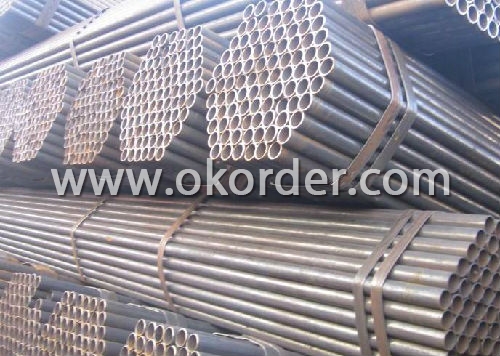
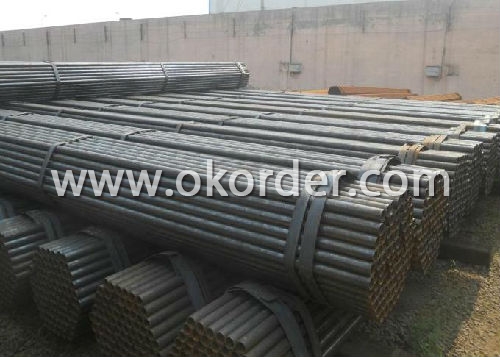
- Q: Can steel pipes be used in plumbing systems?
- Yes, steel pipes can be used in plumbing systems. Steel pipes have been traditionally used in plumbing systems for their durability, strength, and resistance to corrosion. However, other materials like copper and plastic pipes have become more popular in recent years due to their ease of installation, lower cost, and better resistance to certain types of corrosion.
- Q: How are steel pipes used in the manufacturing of scaffolding?
- Steel pipes are commonly used in the manufacturing of scaffolding as they provide structural support and stability. These pipes are used to create the framework of the scaffolding structure, allowing workers to safely access and work at heights. The steel pipes are connected and secured together using couplers, providing a strong and reliable base for the scaffolding system.
- Q: How are steel pipes used in the transportation industry?
- Steel pipes are commonly used in the transportation industry for various purposes such as the construction of pipelines, including oil and gas pipelines, water pipelines, and sewage pipelines. They are also used in the manufacturing of automotive parts, such as exhaust systems, and in the construction of infrastructure such as bridges and tunnels. Additionally, steel pipes are used in the transportation of goods through shipping containers and railway tracks.
- Q: Can steel pipes be used for wastewater treatment?
- Yes, steel pipes can be used for wastewater treatment. Steel pipes are commonly used in various stages of wastewater treatment processes, such as conveyance, distribution, and collection systems. They are durable, corrosion-resistant, and can withstand high-pressure conditions, making them suitable for transporting wastewater efficiently and safely. Additionally, steel pipes can be coated or lined to enhance their resistance to corrosion and improve their performance in harsh wastewater environments.
- Q: What is the maximum pressure that steel pipes can withstand?
- The maximum pressure that steel pipes can withstand depends on various factors such as the pipe's diameter, thickness, quality, and intended application. However, steel pipes are known for their high strength and durability, allowing them to withstand significant pressure.
- Q: Are steel pipes suitable for solar power plants?
- Indeed, solar power plants find steel pipes to be a fitting choice. Owing to their enduring nature, resilience, and ability to resist corrosion, steel pipes are commonly employed in the construction of solar power plants. They serve diverse purposes within these plants, encompassing the conveyance of fluids like water or heat transfer fluids, as well as proffering structural reinforcement for solar panels and other apparatus. Steel pipes excel at enduring high temperatures and pressure, thus rendering them an optimal choice for the efficient functioning of solar power plants. Moreover, steel pipes are readily obtainable and cost-effective, thereby establishing their popularity in the construction of solar power plants.
- Q: Can steel pipes be used for transporting gases and liquids?
- Yes, steel pipes can be used for transporting gases and liquids. Steel pipes are commonly used for this purpose due to their durability, strength, corrosion resistance, and ability to withstand high pressures. Additionally, steel pipes are versatile and can be customized to meet specific requirements for different types of gases and liquids.
- Q: How are steel pipes used in the construction of wind farms?
- Steel pipes are commonly used in the construction of wind farms for various purposes. They are primarily used for the foundation of wind turbine towers, providing structural support and stability. Steel pipes are also used for the transmission of electrical cables, ensuring efficient power distribution throughout the wind farm. Additionally, steel pipes are employed in the construction of access roads, drainage systems, and other infrastructure required for the successful operation of wind farms.
- Q: What is lined pipe?
- Is the coating of the inside of the pipe, such as pipe conveying sulfuric acid will corrode, corrosion, but soft plastic pipe, buried in the ground to wall thicker, then you can use the liner and characteristics of hard for using steel pipe laying, sheathed in the steel pipe into the thin plastic tube, it can transport the sulfuric acid,
- Q: What are the factors affecting the price of steel pipes?
- There are several factors that can affect the price of steel pipes. These factors include: 1. Raw material costs: The price of steel pipes is heavily influenced by the cost of raw materials such as iron ore and coal. Fluctuations in these commodity prices can impact the overall cost of production and subsequently affect the selling price of steel pipes. 2. Supply and demand: Supply and demand dynamics play a significant role in determining the price of steel pipes. When there is a high demand for steel pipes and a limited supply, the prices tend to increase. Conversely, when there is an oversupply of steel pipes and low demand, prices may decrease. 3. Production and manufacturing costs: The cost of producing and manufacturing steel pipes can have a direct impact on their price. Expenses related to labor, energy, transportation, and equipment maintenance can all contribute to the overall cost of production and, in turn, affect the selling price. 4. Market competition: The level of competition in the steel pipe industry can also influence the price of steel pipes. If there are many manufacturers and suppliers competing for market share, prices may be more competitive. On the other hand, if there are fewer competitors, prices may be higher due to limited options. 5. Government policies and regulations: Government policies and regulations can have a significant impact on the price of steel pipes. Import tariffs, trade restrictions, and environmental regulations can all affect the cost of production and subsequently influence prices. 6. Currency exchange rates: Steel pipe prices can also be influenced by currency exchange rates. Fluctuations in exchange rates between countries can impact the cost of importing or exporting steel pipes, which in turn can affect their selling price. 7. Global economic conditions: The overall state of the global economy can impact the price of steel pipes. During periods of economic growth, demand for steel pipes may be higher, leading to increased prices. Conversely, during economic downturns, demand may decrease, resulting in lower prices. It is important to note that these factors can interact with one another and fluctuate over time, making the pricing of steel pipes a complex and dynamic process.
1. Manufacturer Overview
| Location | Hebei,China |
| Year Established | 2005 |
| Annual Output Value | Above 100 Million RMB |
| Main Markets | Main land;Middle East;Southeast Asia |
| Company Certifications | ISO9001 |
2. Manufacturer Certificates
| a) Certification Name | |
| Range | |
| Reference | |
| Validity Period |
3. Manufacturer Capability
| a) Trade Capacity | |
| Nearest Port | Tianjin;Qingdao |
| Export Percentage | 41% - 50% |
| No.of Employees in Trade Department | |
| Language Spoken: | English;Chinese;Korean |
| b) Factory Information | |
| Factory Size: | 120mu |
| No. of Production Lines | 11 |
| Contract Manufacturing | OEM Service Offered;Design Service Offered |
| Product Price Range | High Average |
Send your message to us
High Quality ERW Welded Steel Pipes
- Loading Port:
- China Main Port
- Payment Terms:
- TT or L/C
- Min Order Qty:
- 50MT m.t.
- Supply Capability:
- based on order m.t./month
OKorder Service Pledge
OKorder Financial Service
Similar products
Hot products
Hot Searches
Related keywords
